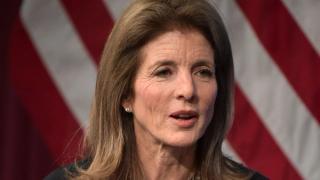US President Joe Biden has nominated Caroline Kennedy as the next US Ambassador to Australia.
This follows months of speculation that Kennedy would be given a high-profile ambassadorial role, possibly to Australia.
It also fills an important vacancy. Australia has been without an US ambassador since Arthur B Culverhouse finished in Canberra in January 2021.
Who is Caroline Kennedy?
Kennedy is of course already well known as the sole surviving child of former US president John F Kennedy and a member of one America’s most famous and influential political dynasties.
She has had an extensive career in her own right. Most notably for Australia, she was a highly regarded US Ambassador to Japan from 2013 to 2017, during the Obama Administration.
If you were to list the qualities of someone you want in an ambassador to Australia at this moment in time, Kennedy is the ideal candidate. You don’t have more trusted hands.
As the first female US ambassador to Japan, Kennedy presided over major shifts in the US-Japanese relationship that included Japan’s launch of its “Free and Open Indo-Pacific” policy (which the Trump administration later adopted), the signing of the Trans-Pacific Partnership, and the historic visits of Prime Minister Shinzo Abe to Pearl Harbor and President Barack Obama to Hiroshima. Earlier this year, Kennedy received the highest Japanese honour awarded to foreigners for her diplomatic efforts.
Before her Japan role, Kennedy, 64, worked in education, was an attorney and author. In a statement following her nomination, Kennedy said she “looked forward” to working with the Australian government
to strengthen our alliance, improve global health and increase vaccine access during this terrible pandemic and to address the urgent climate crisis. I am excited to get to know the Australian people, learn about their fascinating country and share with them what I love most about America.
Why has she been appointed?
If you were to list the qualities of someone you want in an ambassador to Australia at this moment in time, Kennedy is the ideal candidate. You don’t have more trusted hands.
In an increasingly polarised America, she comes from a family that still garners respect across politics. She also knows the Asia-Pacific region well.
Born in the limelight, Kennedy knows how to use the media and publicity to her advantage. It is unlikely she will accidentally make headlines for saying or doing the wrong thing. She will be a strategic and careful player – don’t expect her to stray too far from the Biden administration’s official line.
While she is also known to deftly use subtly when necessary, she is also not one to be strong-armed, and will be clear on what she believes in. For example, when she was in Japan, she did extensive work to support women’s empowerment in a country that ranked near the bottom of global rankings in female workforce participation. Expect her to be a powerful voice on climate action in Australia, in her own way.
Beyond these substantive reasons demonstrating her unique strengths for the role, there are also compelling personal reasons behind her appointment. Her uncle, Ted Kennedy, was a close friend and mentor to Joe Biden over their many decades in the US Senate. And in early 2020, before any of the Democratic primary results were in, Caroline Kennedy endorsed Biden – thereby casting her lot with Biden early in a crowded field.
What does this mean for Australia?
Kennedy’s appointment is both a huge compliment to Australia and a further indication of where the US is placing its concerns and priorities.
The US-Australia alliance is arguably more consequential now than ever. The AUKUS agreement has only just been signed and Australia is at the pointy end of strategic competition in the region.
Kennedy is going to have more than just the US president’s ear – she is also going to be a media sensation in her own right, which will prove helpful for the times when Canberra needs greater attention throughout Washington.
For Australia, having Kennedy in Canberra means its interests will certainly be heard in the White House. It brings a whole new level of gravitas to the relationship.
Yet Kennedy is going to have more than just the US president’s ear – she is also going to be a media sensation in her own right, which will prove helpful for the times when Canberra needs greater attention throughout Washington.
Ultimately, an ambassador can have endless dialogues and policy discussions, but the public perceptions are also critical and the longest lasting. As someone accustomed to intense scrutiny, Kennedy comes with well-prepared.
Such preparation includes being able to work with both sides of politics, regardless of who wins the next Australian election. After all, her accomplishments as the ambassador to Japan occurred under Abe’s government, which was often criticised for its nationalism.
What happens from here?
Kennedy’s nomination now has to be formally approved by the Senate. This used to be a bi-partisan rubber stamp, but it has become increasingly contentious and delayed by party politics.
As a result of such a slow appointment process, the Biden administration currently has more than 180 vacant ambassadorial posts. Out of 80 nominations so far, it has only confirmed 13.
You can assume, however, that the Biden administration waited to go public with its choice until they secured the required senatorial support for Kennedy’s nomination. And that Australia will have its new ambassador as soon as possible in 2022.






